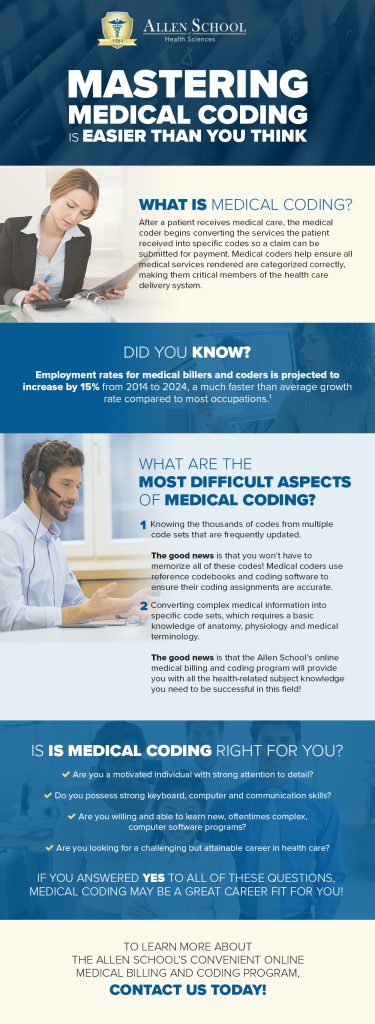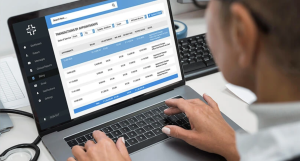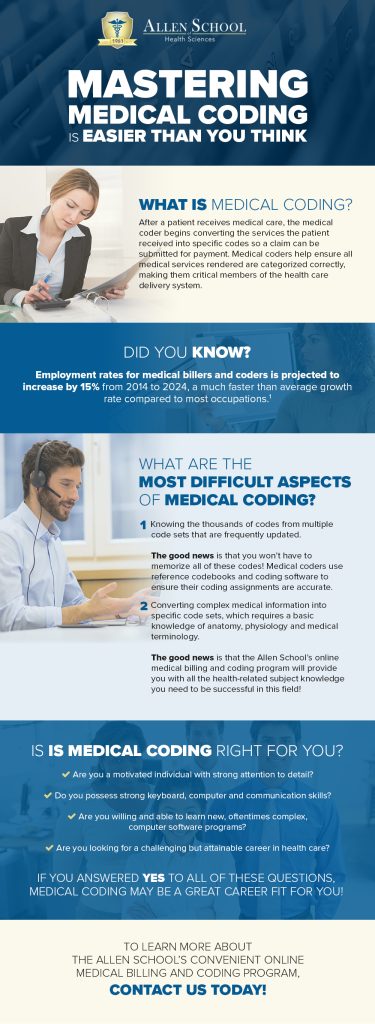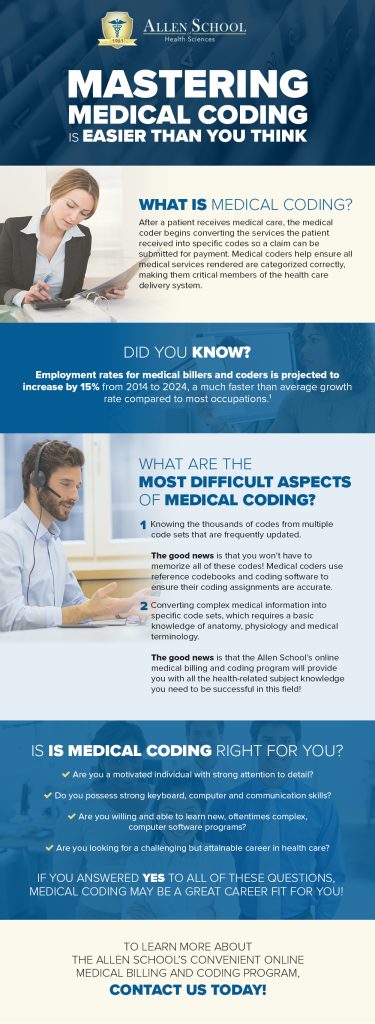Clinical coding is a highly specialized field that plays a crucial role in the efficient management of healthcare data and the delivery of quality patient care. Focused on translating medical diagnoses, procedures, and treatments into universally recognized codes, clinical coders are responsible for ensuring accurate documentation and seamless communication within the healthcare system. With its complex terminology and intricate guidelines, clinical coding can present challenges requiring a deep understanding of medical principles and constant adaptability to ever-evolving industry standards. Nonetheless, for those with a passion for the healthcare field and a commitment to precision, the rewards of this profession are immeasurable.
Understanding Clinical Coding

This image is property of www.allenschool.edu.
Definition of Clinical Coding
Clinical coding, also known as medical coding, is the process of assigning standardized codes to medical diagnoses, treatments, procedures, and services provided to patients. These codes are used by healthcare providers, insurance companies, and government agencies for various purposes, such as reimbursement, research, quality improvement, and resource allocation. Clinical coders play a crucial role in accurately and efficiently translating medical information into a universally recognized coding system.
Importance of Clinical Coding
Clinical coding is essential for the proper functioning of the healthcare system. It not only ensures accurate and efficient payment for healthcare services but also facilitates data collection and analysis for research and healthcare policy development. By assigning codes to medical information, clinical coders enable healthcare providers to communicate effectively and consistently, thereby enhancing patient care and safety. Furthermore, clinical coding helps in identifying trends and patterns in healthcare delivery, enabling improvements in healthcare outcomes and resource allocation.
Skills Required for Clinical Coding

Medical Knowledge
One of the fundamental skills required for clinical coding is a comprehensive understanding of medical terminology, anatomy, physiology, and diseases. Clinical coders need to be familiar with the intricacies of various medical conditions and treatments to accurately assign codes. A strong grasp of anatomy and physiology is crucial in correctly identifying the body systems involved in a diagnosis or procedure. Sound medical knowledge not only ensures accurate code assignment but also helps clinical coders to better understand the clinical context and rationale behind the codes.
Analytical Skills
Clinical coding involves analyzing and interpreting medical information to determine the most appropriate codes. Analytical skills, therefore, play a vital role in clinical coding, as coders need to evaluate complex medical records, recognize patterns, and make informed decisions. Effective analytical skills enable clinical coders to identify any discrepancies or inconsistencies in medical documentation and consult with healthcare providers when necessary to ensure accurate coding.
Attention to Detail
Given the intricate nature of clinical coding, attention to detail is paramount. Clinical coders must be meticulous in reviewing medical records, extracting relevant information, and assigning accurate codes. A single error in code assignment can have significant consequences, leading to inaccurate billing, compromised patient care, and potential legal issues. By paying close attention to details, clinical coders can ensure the integrity and reliability of coded data.
Technical Skills
Proficiency in various coding systems, software, and electronic health record (EHR) systems is essential for clinical coders. Familiarity with coding classification systems such as International Classification of Diseases (ICD), Current Procedural Terminology (CPT), and Healthcare Common Procedure Coding System (HCPCS) is necessary for accurate code assignment. Additionally, clinical coders should be adept at utilizing coding software and EHR systems to efficiently navigate and retrieve medical information. Strong technical skills enable coders to effectively and efficiently perform their coding duties.
Challenges in Clinical Coding
Vast Amount of Information
Clinical coders encounter a vast amount of medical information on a regular basis. They must review medical records, including physician’s notes, laboratory reports, imaging studies, and other relevant documentation. This abundance of information presents a challenge as coders must accurately extract and interpret the necessary data to assign appropriate codes. Keeping up with the ever-expanding medical knowledge base requires continuous learning and staying updated with code changes and updates.
Code Changes and Updates
Another challenge in clinical coding is the constant evolution of coding systems. New codes are introduced, existing codes are revised, and obsolete codes are retired regularly. Clinical coders need to stay updated with these changes to ensure accurate code assignment. Failure to keep pace with code changes and updates can result in coding errors and subsequent complications, such as claim denials, reimbursement inconsistencies, and compromised patient care.
Complex Cases
Clinical coding can become particularly challenging when dealing with complex medical cases. Some diseases or treatments may not have straightforward codes, requiring coders to navigate through multiple coding options or consult with healthcare professionals for clarification. Complex cases may also involve rare or unique conditions that do not have predefined codes, necessitating additional research and analysis. Clinical coders must possess the expertise and critical thinking skills to accurately assign codes in such complex scenarios.
Training and Education for Clinical Coding

Certification Programs
Many organizations offer certification programs specifically designed to train and assess clinical coders. These programs focus on developing and evaluating the necessary knowledge and skills required for clinical coding. Certification programs often cover topics such as medical terminology, anatomy and physiology, coding systems, coding guidelines, and ethical considerations. Completing a recognized certification program demonstrates competence and enhances employment opportunities in the field of clinical coding.
Degree Programs
Some individuals may choose to pursue a degree in health information management or a related field to acquire comprehensive knowledge and skills in clinical coding. These degree programs typically cover a broader range of subjects, including health information technology, medical coding and classification, healthcare law and regulations, and data management. A degree in health information management can provide a solid foundation for a career in clinical coding and may offer additional career advancement opportunities in healthcare administration or management.
Continuing Education
Given the dynamic nature of the healthcare industry, it is crucial for clinical coders to engage in continuing education to keep their knowledge and skills up to date. Continuing education programs, workshops, conferences, and seminars provide opportunities for clinical coders to expand their knowledge, stay informed about code changes and updates, and enhance their professional development. Continuous learning and professional growth are essential for maintaining competence and being effective in the field of clinical coding.
Working as a Clinical Coder

This image is property of www.northwestcareercollege.edu.
Job Description
Clinical coders are responsible for reviewing medical records and assigning appropriate codes to diagnoses, treatments, procedures, and services provided to patients. They ensure coding accuracy, adherence to coding guidelines, and compliance with relevant regulations. Clinical coders work closely with healthcare providers and other members of the healthcare team to clarify documentation or obtain additional information when necessary. Additionally, they participate in quality assurance activities and may provide coding education and training to healthcare professionals.
Work Environment
Clinical coders typically work in healthcare facilities such as hospitals, clinics, or medical billing companies. They may work in coding departments, health information management departments, or revenue cycle management departments. The work environment is generally office-based, with coders using computers and coding software to perform their duties. Clinical coders may work independently or as part of a coding team, collaborating with other coders or consulting with healthcare providers for coding clarity.
Job Prospects and Salary
The demand for clinical coders is expected to remain strong in the coming years. As healthcare systems strive for greater efficiency, accurate and efficient clinical coding becomes increasingly vital. Job prospects for clinical coders are generally favorable, especially for those with relevant certifications, experience, and advanced coding skills. The median annual wage for clinical coders varies depending on factors such as experience, education, geographic location, and work setting. However, the average salary for clinical coders is competitive, and career advancement opportunities are available for those who excel in their coding skills and knowledge.
Tips for Success in Clinical Coding

Stay Updated
Staying updated with the latest coding guidelines, code changes, and industry developments is crucial for success in clinical coding. Clinical coders must actively seek opportunities to enhance their knowledge and skills through continuing education, professional associations, and participation in coding workshops or conferences. Subscribing to coding journals and online forums can also provide valuable insights into emerging coding trends and challenges.
Develop Strong Coding Skills
Developing and honing coding skills is essential for clinical coders. Regular practice in assigning codes, case studies, and coding simulations can help coders strengthen their coding abilities and become more proficient in code assignment. Collaborating with experienced coders or mentors can offer valuable guidance and feedback for improvement. Continuous learning, along with attention to detail and critical thinking, will contribute to the development of strong coding skills.
Collaborate with Healthcare Providers
Effective communication and collaboration with healthcare providers are crucial for accurate coding. Clinical coders should establish open lines of communication with physicians, nurses, and other healthcare professionals to clarify documentation, seek clarification when necessary, and ensure accurate code assignment. Regular meetings or discussions with healthcare providers can promote effective collaboration and enhance the overall quality of coding.
Advancements in Clinical Coding

This image is property of thumbor.forbes.com.
Technology and Automation
Advancements in technology have revolutionized clinical coding by introducing automation and artificial intelligence (AI) tools. AI-powered coding software can analyze medical documentation, extract relevant information, and suggest appropriate codes. This technology can expedite the coding process, reduce errors, and enhance coding accuracy. However, while automation can streamline routine coding tasks, human coders will continue to play a critical role in complex coding scenarios and maintaining the integrity of coded data.
Standardization of Code Sets
Efforts are continuously being made to standardize code sets to improve interoperability and simplify coding processes. Collaborative initiatives, such as the ICD-11 development and the refinement of existing code sets, aim to enhance coding efficiency and accuracy. By establishing globally recognized code sets and refining coding guidelines, clinical coders can expect standardized practices that simplify and harmonize coding across healthcare organizations.
Increased Accuracy
With the integration of technology and ongoing advancements, clinical coding accuracy is expected to improve. AI-powered coding tools can assist clinical coders in identifying potential errors or inconsistencies in documentation, reducing the likelihood of coding mistakes. Standardization efforts, improved training programs, and continuing education opportunities can also contribute to increased accuracy in clinical coding. As a result, healthcare organizations can rely on more precise coded data to support decision-making processes and improve patient care outcomes.
Future of Clinical Coding

Role of Artificial Intelligence
As AI technology continues to evolve, its role in clinical coding is expected to expand. AI-powered coding software can analyze vast amounts of medical data, recognize patterns, and suggest coding options based on algorithms and machine learning. This technology has the potential to significantly enhance coding accuracy, efficiency, and productivity. However, human clinical coders will still be essential in interpreting complex cases, ensuring coding compliance, and collaborating with healthcare providers.
Expansion of Coding Specialties
Clinical coding is a dynamic field with various coding specialties that focus on specific areas of healthcare. As medical knowledge advances and healthcare practices evolve, the need for specialized clinical coders will increase. Coding specialties can include areas such as inpatient coding, outpatient coding, professional fee coding, and risk adjustment coding. Specializing in a specific coding area can provide coders with a competitive edge and open up new career opportunities within the field.
Integration with Electronic Health Records
The integration of clinical coding with electronic health records (EHRs) is expected to continue growing. EHRs enable real-time documentation and improve the accuracy and accessibility of patient information. By integrating coding functionalities into EHR systems, clinical coders can seamlessly assign codes as part of the patient care process. This integration can streamline coding workflows, reduce duplication of efforts, and enhance data accuracy, ultimately improving the efficiency and effectiveness of clinical coding.
Conclusion

This image is property of i.ytimg.com.
Final Thoughts
Clinical coding plays a vital role in ensuring accurate and efficient communication, reimbursement, research, and quality improvement within the healthcare industry. Astute medical knowledge, analytical skills, attention to detail, and technical expertise are essential for clinical coders to excel in their roles. While clinical coding poses several challenges, continuous learning, staying updated, and collaborating with healthcare providers can contribute to success in this field.
Summary of Difficulty
Clinical coding can be difficult due to the vast amount of medical information, frequent code changes and updates, and complex cases. However, with proper training, education, and ongoing professional development, clinical coders can overcome these challenges. Advancements in technology, such as AI-powered coding software, standardized code sets, and improved accuracy, are transforming the field of clinical coding. The future of clinical coding holds promise, with the integration of AI, specialization opportunities, and further integration with electronic health records.






















